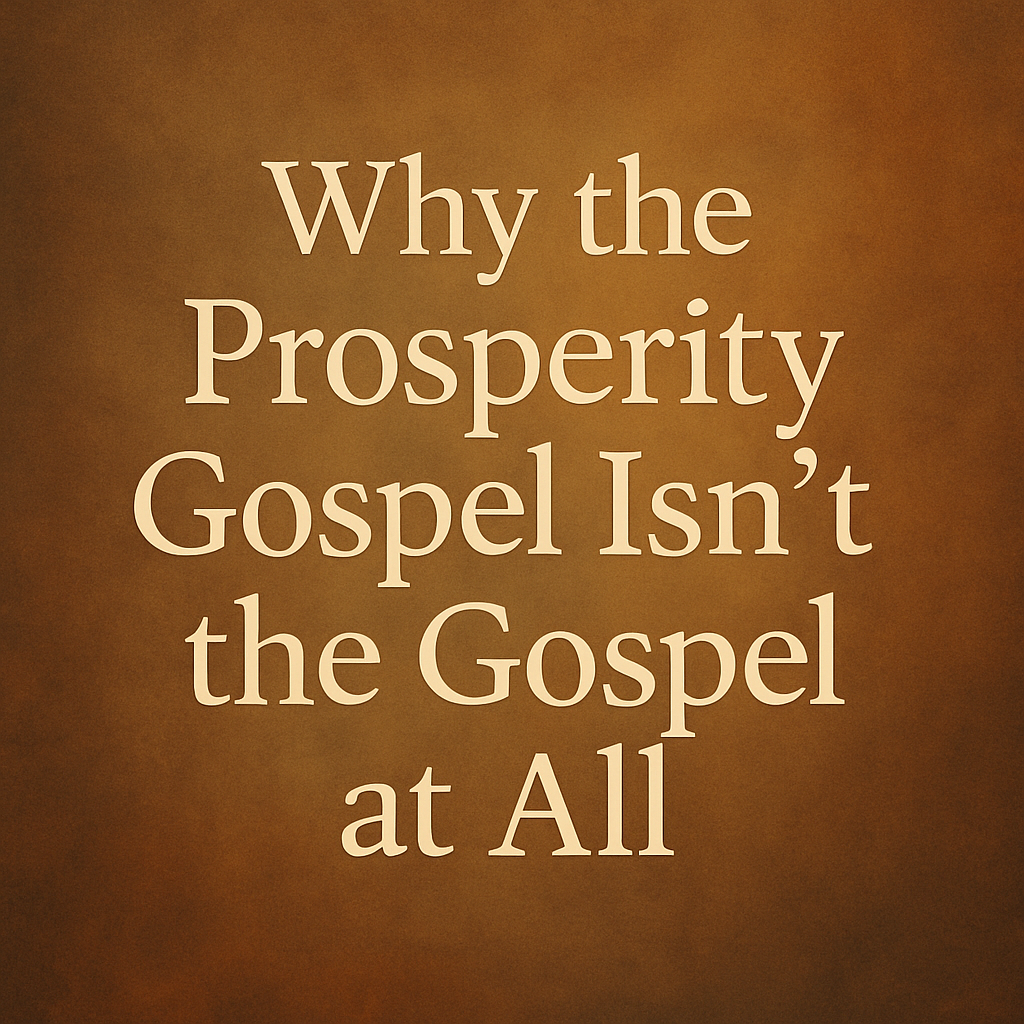⏱️ Estimated Reading Time: 4 min read
Why the Prosperity Gospel Isn’t the Gospel at All
Understanding the Eternal Danger of a Counterfeit Message
By Dave Jenkins | Contending for the Word
The gospel of Jesus Christ is good news for sinners—not a blueprint for worldly success. And yet, the prosperity gospel has grown into one of the most popular distortions of Christianity today, especially in the West and across the Global South.
That leads to the essential question:
Is the prosperity gospel heresy?
Yes—it is. The prosperity gospel is heresy because it preaches another gospel (Galatians 1:6–9). It twists Scripture, redefines blessing, misrepresents Christ, and offers people the treasures of this world in exchange for the truth of the cross.
What Is the Prosperity Gospel?
The prosperity gospel teaches that God wants all believers to be physically healthy, financially wealthy, and successful in this life. It often promises that through faith, positive confessions, and generous giving, you can unlock divine favor and live your best life now.
This message is often summarized by phrases like:
“Name it, claim it. Believe it, receive it.”
But behind these catchy slogans is a dangerous theology—one that reduces God to a cosmic genie and faith to a magical force. It uses Bible verses out of context, exploits human pain, and repackages greed as spirituality.
Why Is the Prosperity Gospel Considered Heresy?
The prosperity gospel is not a minor disagreement about secondary issues—it is a fundamental distortion of biblical Christianity. It denies or perverts the essential truths of the gospel and the character of God.
Here’s why it is rightly labeled heresy:
- It redefines blessing – Replacing spiritual riches in Christ (Ephesians 1:3) with promises of health, wealth, and comfort.
- It downplays sin and repentance – Rarely addressing the need for confession, brokenness, or the cross.
- It turns faith into a force – Treating belief as a mechanism to manipulate outcomes.
- It promises what God never did – A pain-free, prosperous life now, in contrast to what Jesus and the apostles taught.
- It proclaims a different gospel – Centered on self-glorification rather than Christ crucified (Galatians 1:6–9).
Ultimately, it replaces Jesus as the treasure with worldly success as the goal.
What Does the Bible Say About Suffering and Prosperity?
The Scriptures never promise ease in this life—but they do promise eternal life in Christ. Over and over again, the Bible prepares believers for suffering and hardship:
- Jesus said: “In the world you will have tribulation. But take heart; I have overcome the world.” (John 16:33)
- Paul taught: “Through many tribulations we must enter the kingdom of God.” (Acts 14:22)
- True prosperity is not health or wealth—it’s Christ Himself: “I count everything as loss because of the surpassing worth of knowing Christ Jesus my Lord.” (Philippians 3:8)
- God may give material blessing, but it’s never guaranteed—and suffering is often used to shape us (Romans 5:3–5; James 1:2–4).
Biblical faith embraces Christ regardless of our circumstances.
Who Promotes the Prosperity Gospel?
The influence of prosperity theology has spread across television, books, YouTube channels, and global crusades. Some of its most prominent advocates include:
- T.D. Jakes
- Kenneth Copeland
- Creflo Dollar
- Benny Hinn
- Joel Osteen
- Bill Johnson (Bethel Church)
- Joyce Meyer
These teachers often avoid hard doctrines like sin, judgment, and holiness, offering instead a therapeutic version of Christianity focused on personal breakthrough and success.
How Should Christians Respond?
Scripture calls believers to expose false teaching, proclaim the truth, and shepherd others toward gospel clarity. We must respond to the prosperity gospel with both biblical conviction and pastoral compassion.
Here’s how:
- Reject it openly – Identify the prosperity gospel as a false teaching (2 Peter 2:1–3).
- Preach the real gospel – Christ crucified, risen, and reigning (1 Corinthians 15:1–4).
- Expose error graciously – Shine the light of truth (Ephesians 5:11; Titus 1:9).
- Offer the better hope – Not a life of ease, but a Savior who walks with us through the fire.
We need to preach a gospel that prepares people for heaven, not manipulates them for earth.
Christ Is the Treasure—Not a Means to One
The prosperity gospel is heresy because it exchanges the glory of Christ for the empty promises of worldly comfort. It cannot save. It cannot sustain. And it will not prepare anyone for eternity.
Jesus never promised us wealth or ease in this life—but He promised Himself. And that’s infinitely better.
Recommended Resources
- Check out more from Contending for the Word Q&A and more from our podcast, Contending for the Word at YouTube.
- American Gospel (Documentary) – A powerful exposé of false gospels and true hope in Christ
Dave Jenkins is happily married to his wife, Sarah. He is a writer, editor, and speaker living in beautiful Southern Oregon. Dave is a lover of Christ, His people, the Church, and sound theology. He serves as the Executive Director of Servants of Grace Ministries, the Executive Editor of Theology for Life Magazine, the Host and Producer of Equipping You in Grace Podcast, and is a contributor to and producer of Contending for the Word. He is the author of The Word Explored: The Problem of Biblical Illiteracy and What To Do About It (House to House, 2021), The Word Matters: Defending Biblical Authority Against the Spirit of the Age (G3 Press, 2022), and Contentment: The Journey of a Lifetime (Theology for Life, 2024). You can find him on Facebook, Twitter, Instagram, Youtube, or read his newsletter. Dave loves to spend time with his wife, going to movies, eating at a nice restaurant, or going out for a round of golf with a good friend. He is also a voracious reader, in particular of Reformed theology, and the Puritans. You will often find him when he’s not busy with ministry reading a pile of the latest books from a wide variety of Christian publishers. Dave received his M.A.R. and M.Div through Liberty Baptist Theological Seminary.




